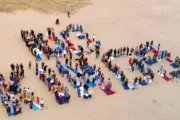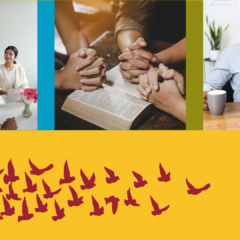by Danny McCain
“There has been another bombing in Jos.” Those words from my neighbor interrupted CNN’s September 11th memorial activities I was watching. Our city of Jos in north-central Nigeria had just experienced perhaps the only terrorist bombing on the tenth anniversary of 9/11.
Unfortunately, this bombing was not as shocking as earlier terrorist attacks because it was simply a continuation of violence that started in Jos on September 7th, 2001, four days before America’s great tragedy. On that day, an ethno-religious crisis ignited that has flared up five times in the last ten years. These crises have killed far more people than the September 11th attacks, including my mechanic, my painter, a colleague who had taught under my supervision, my next-door neighbor of 19 years and one of my university students. These victims died from cutlasses, sticks, bows and arrows, homemade guns, bombs, and AK-47 assault rifles. During this period, seven churches and one mosque were burned within a mile of my house.
What have we in Nigeria learned from these ten years of violence? First, we have learned that violence and retaliation breed hatred and more violence. The violence in Jos began in 2001 with an attack on smaller ethnic groups, who are mostly Christians, by mostly Muslim Hausas, over a contested political appointment. The local Christians then retaliated in kind—with burning and killing. In the outlying villages, Christian Berom farmers lashed out against Muslim Fulani cattle herders by killing cows, their most prized possessions. Fulanis retaliated by invading villages in the night and killing Berom women and children. Beroms in turn killed more Fulanis. The cycle continues. Only three days ago fourteen members of a Berom family were killed in a night attack by Fulani raiders.
Second, we have learned that angry rhetoric and jubilation over the tragedies of our “enemies” teach our children to hate. Recently, a friend told me: “Yesterday my son said, ‘Papa, did you buy that suit in America?’” My friend replied, “No, I bought it from a Hausa man.” The four-year-old quickly said, “No, Papa, you should not buy anything from a Hausa man.” Despite the fact his father employs several Hausas, this child has learned elsewhere that Hausa Muslims are evil and should be avoided.
Today, a Muslim law student told me that recently his nephew saw some scratches on his vehicle from an earlier accident and said, “Uncle, did the infidels do this to your car?” The nephew has learned from someone that Christians are the people who destroy property.
We feel justified and get some satisfaction out of verbally abusing those perceived to be our enemies but the bitterness and anger plant seeds of hatred and violence in our children that later produce a horrifying harvest of hostility and destruction.
Third, we have learned that forgiveness and reconciliation provide the best way to neutralize violence. Jesus, a figure sacred to both religions, taught that for peace and harmony to exist, the cycle of retaliation and violence has to be broken. He made this radical statement: “Love your enemies, do good to those who hate you” (Luke 6:27). Loving and doing good implies learning about, interacting with, and thinking the best about others, even those who appear to be enemies.
In an attempt to follow Jesus’ teachings, we have made many peace efforts in Jos, including inter-faith dialogue, joint rallies with Christian and Muslim youth, training programs and a whole lot of research papers presented in various conferences to fellow academics. We are having modest success with specific individuals and communities.
For example, in a community devastated by violence in 2010, peace activists recently organized a soccer program for Christian and Muslim youths. On the first day, each side became nervous when they recognized fighters from the other side. However, after spending a week together playing soccer and learning about forgiveness, reconciliation, and non-violence, when youths came from another area and tried to instigate fighting, the Christian and Muslim youths stood together to resist violence and keep peace in their community.
Would we in the western world not be able to better address our own anger and start to break the cycle of misunderstanding and stereotyping if we would teach our children those profound words about love and goodness—words from the one recognized as the “Prince of Peace”?
“Love is the only force capable of transforming an enemy into friend” (Martin Luther King, Jr.).
This article is one in an occasional series of dispatches from scholars in the Center for Religion and Civic Culture’s global research network.
Danny McCain of the University of Jos is the principal investigator of the Nigeria Pentecostal and Charismatic Research Centre, which receives grant support from the Pentecostal and Charismatic Research Initiative. Prof. McCain, an American, has lectured continuously at the University of Jos since 1991 and has had significant experience creating academic projects and coalitions in Africa.







